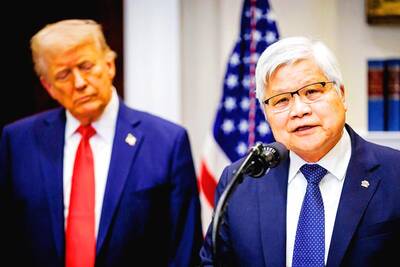The first phase of the nation’s first 5G auction ended yesterday after 27 days and 261 rounds of bidding, with the total bids topping NT$138.08 billion (US$4.61 billion), the National Communications Commission (NCC) said.
The amount, which was about 4.6 times more than the floor price, was the world’s third-highest, the commission said.
Italy raised 6.55 billion euros (US$7.31 billion) in its first 5G auction in 2018 and Germany obtained 6.5 billion euros in its auction last year, it said.

Photo: AP
The frequency bands on auction were 1.8 gigahertz (GHz), 3.5GHz and 28GHz.
However, all of the telecoms targeted the 3.5GHz frequency band, of which a total of 270 megahertz (MHz) of bandwidth was placed on auction. The floor price for bandwidth in the 3.5GHz band was NT$24.3 billion.
Chunghwa Telecom (中華電信) secured 90MHz of bandwidth in the 3.5GHz band, followed by Far EasTone Telecommunications (遠傳電信) with 80MHz. Taiwan Mobile (台灣大哥大), Taiwan’s second-largest telecom, only secured 60MHz of bandwidth in the band and Taiwan Star Telecom (台灣之星) obtained 40MHz.
Asia Pacific Telecom (亞太電信) yesterday withdrew its bid for bandwidth in the band.
Bids for 3.5GHz bandwidth totaled NT$136.43 billion.
There was a total of 2.5GHz of bandwidth available in the 28GHz frequency band, but carriers only bid for 1.6GHz.
Chunghwa Telecom secured 600MHz and Taiwan Mobile obtained 200MHz, while Far EasTone and Asia Pacific Telecom garnered 400MHz each. Taiwan Star did not bid for the bandwidth in this frequency band.
Bids for bandwidth in the 28GHz frequency band totaled NT$1.65 billion.
The 1.8GHz frequency band failed to attract any bids, the commission said.
All five carriers are to participate in the second phase of the auction on Feb. 21, when they would negotiate for their preferred portions of the frequency bands in the morning, it said.
Should they fail to reach an agreement, they would enter one final round of bidding in the afternoon before the auction is concluded, it added.
The bids far exceeded the projected goals set by the Executive Yuan and the Legislative Yuan of NT$40 billion and NT$44 billion respectively, NCC Acting Chairman Chen Yaw-shyang (陳耀祥) said.
However, the government has administrative measures to ensure that consumers enjoy “high-quality and affordable” 5G services, he said.
The Cabinet would hold an interdepartmental meeting to discuss the distribution of the excess proceeds from the auction, such as upgrading telecom infrastructure and developing innovative services, he added.
Asked about Asia Pacific Telecom withdrawing its bid for 3.5GHz bandwidth, which allowed the first phase to end yesterday, Chen said that the commission respects the company’s decisions, adding that telecoms would be able to flexibly form partnerships with each other after the agency starts enforcing the Telecommunications Management Act (電信管理法) in July.
The act, which was promulgated by President Tsai Ing-wen (蔡英文) in June last year, only states the principle that resources should be used efficiently and that there is fair competition in the telecom service market, NCC Department of Platforms and Businesses Director Wang De-wei (王德威) said.
Under this principle, telecoms are allowed to share their frequency spectrum or lease it from other carriers, Wang said, adding that they must first indicate such details in their business plans.
After the auction is concluded next month, telecoms that secure 5G frequency spectrum can choose to make a one-time payment for their bids or pay in installments over five years, the commission said, adding that they would be allowed to start offering 5G services only after their business plans and service networks receive its approval.

ENDEAVOR MANTA: The ship is programmed to automatically return to its designated home port and would self-destruct if seized by another party The Endeavor Manta, Taiwan’s first military-specification uncrewed surface vehicle (USV) tailor-made to operate in the Taiwan Strait in a bid to bolster the nation’s asymmetric combat capabilities made its first appearance at Kaohsiung’s Singda Harbor yesterday. Taking inspiration from Ukraine’s navy, which is using USVs to force Russia’s Black Sea fleet to take shelter within its own ports, CSBC Taiwan (台灣國際造船) established a research and development unit on USVs last year, CSBC chairman Huang Cheng-hung (黃正弘) said. With the exception of the satellite guidance system and the outboard motors — which were purchased from foreign companies that were not affiliated with Chinese-funded

PERMIT REVOKED: The influencer at a news conference said the National Immigration Agency was infringing on human rights and persecuting Chinese spouses Chinese influencer “Yaya in Taiwan” (亞亞在台灣) yesterday evening voluntarily left Taiwan, despite saying yesterday morning that she had “no intention” of leaving after her residence permit was revoked over her comments on Taiwan being “unified” with China by military force. The Ministry of the Interior yesterday had said that it could forcibly deport the influencer at midnight, but was considering taking a more flexible approach and beginning procedures this morning. The influencer, whose given name is Liu Zhenya (劉振亞), departed on a 8:45pm flight from Taipei International Airport (Songshan airport) to Fuzhou, China. Liu held a news conference at the airport at 7pm,

KAOHSIUNG CEREMONY: The contract chipmaker is planning to build 5 fabs in the southern city to gradually expand its 2-nanometer chip capacity Taiwan Semiconductor Manufacturing Co (TSMC, 台積電), the world’s biggest contract chipmaker, yesterday confirmed that it plans to hold a ceremony on March 31 to unveil a capacity expansion plan for its most advanced 2-nanometer chips in Kaohsiung, demonstrating its commitment to further investment at home. The ceremony is to be hosted by TSMC cochief operating officer Y.P. Chyn (秦永沛). It did not disclose whether Premier Cho Jung-tai (卓榮泰) and high-ranking government officials would attend the ceremony. More details are to be released next week, it said. The chipmaker’s latest move came after its announcement earlier this month of an additional US$100 billion

Authorities yesterday elaborated on the rules governing Employment Gold Cards after a US cardholder was barred from entering Taiwan for six years after working without a permit during a 2023 visit. American YouTuber LeLe Farley was barred after already being approved for an Employment Gold Card, he said in a video published on his channel on Saturday. Farley, who has more than 420,000 subscribers on his YouTube channel, was approved for his Gold Card last month, but was told at a check-in counter at the Los Angeles International Airport that he could not enter Taiwan. That was because he previously participated in two